However, the delicate composition of the coconut presents many challenges for manufacturers: the contents degrade quickly when exposed to air, and measures are required at every step of the production process to protect product quality.

In response to the challenges, Tetra Pak has published an 180-page guide called the Coconut Handbook, offering advice and practical information on everything from plantations and nutritional benefits to production and distribution.
The company believes, having established a Coconut Knowledge Centre in Singapore in 2012, it can share its industry processing knowledge to help more companies succeed in this growing beverage category.
BeverageDaily talks to Samit Chowdhury, cluster marketing service director, Tetra Pak Asia, about the handbook.
BD: When are you launching the coconut handbook, why and where in the world?
SC: The Coconut Handbook was launched globally on April, 28, 2016. Coconut-based beverages have surged in popularity and Tetra Pak saw an opportunity to create a single knowledge source which covers the entire value chain (from tree to table) of coconut. The Coconut Handbook is available online to order by anyone, anywhere in the world.
BD: Are the publicized benefits about coconut drinks just another industry ‘fad’ for manufacturers to differentiate themselves from their competitors?
SC: No. Coconut products have several health benefits which are part of the reason why they are so popular. For example, coconut water is a natural diuretic and helps maintain digestive health. Coconut water has become very popular for rehydration, due to its ability to rehydrate the human body with its nutritional content, known as “Nature’s Isotonic”. Compared to other beverages, the human body can absorb coconut water’s fluid levels and electrolytes more quickly and efficiently. It is a good and natural rehydration alternative to plain water and sports drinks. A number of studies on other uses of coconut products such as oil, milk and topical ointments are also showing a number of positive health effects.
Furthermore, there is an emerging trend, “the vegan movement”, of consumers seeking plant-based protein. This trend has emerged from lactose intolerance amongst many consumers, as well as a move towards a vegetarian diet and low fat alternatives. Soy, almond and coconut all provide a solution for this emerging trend.
BD: How is Tetra Pak going to draw on its 20 year experience to talk about the benefits of coconut processing?
SC: The motivation behind creating the Coconut Handbook was to help our customers respond to the growing trend for coconut products. With this in mind, we wanted the handbook to speak from all angles of the coconut supply chain, giving our customers information about market opportunities to help them build the case for introducing coconut into their product portfolios. Tetra Pak is drawing on its expertise by providing a range of information including product development, technical and consumer knowledge, innovative packaging and processing.
BD: What are the specific processing requirements and challenges for coconut products?
SC: One of the main challenges is to transport fresh raw materials to the processing plant in the shortest time and process them within three to 10 days from time of harvest. This is especially important for coconut water processing. Prolonged storage of the coconuts will also have an impact on the turbidity – or the “cloudiness” – of the coconut water.
Secondly, good manufacturing practice is needed during the extraction process, including the cooling of the raw materials to 4°C to stop the enzymatic reaction and growth of micro-organisms.
Thirdly, coconut products are prone to oxidation. Therefore, the process design and equipment selection is critical to avoid products having contact with the air. The coconut product is sensitive to high thermal impact that can affect the colour and taste. For this reason, the UHT system with direct steam injection is normally recommended for both coconut water and coconut cream. However, some customers may opt for an indirect UHT system if they prefer the coconut cream to have a more “cooked” taste.

BD: Is coconut something we are going to see more of on supermarket shelves in the future?
SC: Absolutely, in 2015 the global packaged coconut water market was estimated to be worth more than $1bn, with the US and Brazil leading in consumption and growth. Of particular interest, ready to drink (RTD) coconut milk beverages are rapidly growing in the US: sales have grown by three times over the past four years to 60 million litres. Although the European market is behind the US and Brazil, consumers are gaining more awareness of coconut water’s nutritional and health benefits.
With so many different uses of coconut (milk, water, oil, flour and medicine), it is easier for consumers to introduce it into their diet. Also, with an increase in the vegan, lactose-free and gluten-free trends in cooking, we anticipate sustained growth of the market.
BD: How can manufacturers benefit from the information in your handbook about the supply chain and the production and distribution of coconut beverages?
SC: For many manufacturers, coconut products are still fairly new in their product portfolio. The Coconut Handbook is a comprehensive resource that explains every stage of the supply chain from tree to table, to give customers a full picture of the product and what it entails. In other words, it’s a one stop shop for any manufacturer thinking of incorporating coconut products into their portfolio.
BD: Why did you choose Singapore as the world’s first Coconut Knowledge Centre?
SC: The Coconut Knowledge Centre is a Tetra Pak operation based in Singapore. 75% of total global coconut production is in Indonesia, India and Philippines, making the centre ideally placed to tap into local knowledge on coconut production. Additionally we have a Product Development Centre (PDC) in Singapore. The PDC is a smaller version of a commercial plant, where we are able to practically experiment with the commercial viability of research & development.
BD: What’s next?
SC: We are very passionate about coconut production. The Coconut Handbook has been an exciting step towards consolidating our extensive knowledge and sharing it with our customers so we can work with them to hopefully introduce coconut into their product portfolio.
The research never stops. We are in constant dialogue with our coconut customers on their concerns and issues, working to find solutions for them. We will also continue collaborating with the University of Science in Malaysia to carry out more research on coconut water quality and stability.
